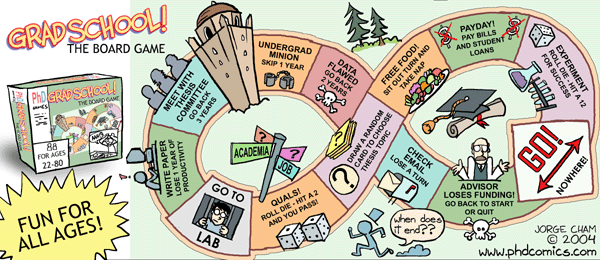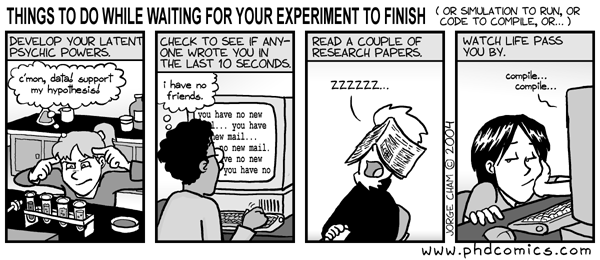
Today Science published an article on the problems LHC grad students are facing due to the multi-year delays of said grand machine. Our problem is the same as the rest of the physics community's: the conspicuous lack of data. As the article points out, this problem has different ramifications for different students. Students at European institutions who have only three or four years to finish their PhD end up doing their theses on simulations of what the LHC might see once it turns on. Students at US institutions must do their theses on data and the article discusses those who switched to other experiments. It did not mention, however, the majority of US students, such as myself, who did not or could not switch and are waiting. and waiting. and waiting. For most of us, our groups have not maintained a presence on existing experiments and so switching is essentially not an option unless we want to go it alone or be adopted by a group still active in the running experiments. So we are waiting, performing needed work for the experiments, gaining valuable experience, but not achieving the final step in grad school, the dissertation.

Why do US institutions insist that data is necessary? It is a fact, which the article points out, that simulation analyses are overly simplistic and unable to capture the full complications of working with real data. In American academic culture, the ability to identify and circumnavigate those difficulties are considered important enough that a student has not completed the PhD apprenticeship until he or she has demonstrated these skills. Do Europeans value this attribute less? Probably not, but the pragmatism necessitated by only four years of funding for their students trumps everything else. Most US institutions, on the other hand, do not bat an eye at a student taking 8 years or more to complete a PhD. In fact, the image of the grad student slaving away for years on end is somewhat glorified.

Currently there are about three years of US grad students treading water due to the LHC delays while the flow of PhDs coming out of running experiments has slowed to a trickle. So the US institutions, who hold data analyses in such high regard, are starting to consider and hire post docs who have done theses on simulation. As one of the students stuck in limbo I can say that it's a little painful to watch, but I acknowledge that they have no other options. I can also acknowledge that I'm indoctrinated enough in US academic culture that I do not want a simulation thesis, even though I know that the European students are no less capable of being 'good physicists' than I. I just keep telling myself that what I'm doing right now is interesting and data will come someday. Besides, the longer the LHC is delayed, the longer I get to stay in Berkeley :).
 PS: The plight of current post docs is much worse than grad students. Without data they can't get faculty positions and they can only remain postdocs for a certain number of years.
PS: The plight of current post docs is much worse than grad students. Without data they can't get faculty positions and they can only remain postdocs for a certain number of years.

No comments:
Post a Comment